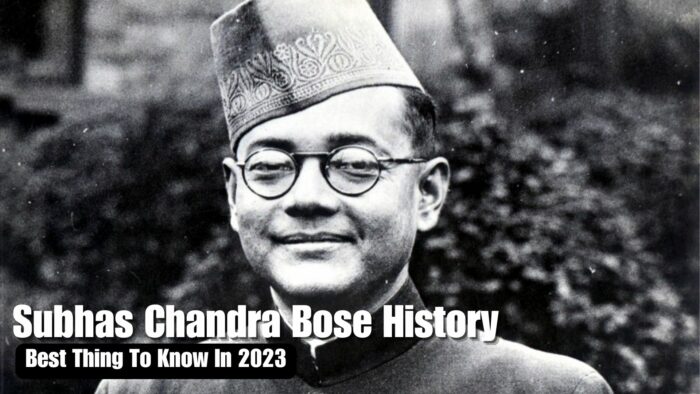
Subhas Chandra Bose History: Best Thing To Know In 2023
Subhas Chandra Bose history needs to be enlightened once again for the future generations of India. Subhas Chandra Bose, a prominent figure in India’s fight for independence, is a historical figure whose life and contributions inspire generations.
Known for his unwavering determination and revolutionary spirit, Bose played a crucial role in shaping the course of India’s struggle against British rule.
From his early political career to his formation of the Indian National Army, Bose’s story is one of resilience, bravery, and the pursuit of freedom. Born on January 23, 1897, in Cuttack, Odisha, Bose was deeply influenced by his nationalist parents and the prevailing political climate.
His journey took him from studying at Cambridge University to becoming a prominent leader of the Indian National Congress. Bose’s revolutionary ideas and his belief in direct action challenged the non-violent approach advocated by Mahatma Gandhi, leading to his eventual split from Congress and the formation of his army.
In this article, we will delve into the life and legacy of Subhas Chandra Bose, exploring his early years, his role in the freedom struggle, and the controversies surrounding his mysterious death. Join us as we unravel the captivating history of this remarkable leader and his enduring impact on the fight for independence in India.
Subhas Chandra Bose History
Who was Subhas Chandra Bose, and what is his place in history?
Subhas Chandra Bose was an Indian nationalist leader and freedom fighter who played a significant role in the Indian independence movement against British rule. Born in 1897, Bose was known for his intense patriotism and unwavering determination to free India from British colonial rule.
He was a charismatic and influential leader who inspired millions of Indians to join the struggle for independence. Bose is best remembered for establishing the Azad Hind Government, also known as the Provisional Government of Free India, in 1943.
He formed the Indian National Army (INA) to liberate India from British rule by force. Bose’s efforts, along with the INA’s military campaigns against the British, contributed to the eventual independence of India in 1947.
What were Subhas Chandra Bose’s early life and education like?
Subhas Chandra Bose was born on January 23, 1897, in Cuttack, Odisha, in British India. He came from a well-educated and politically active family. Bose’s father, Janakinath Bose, was a prominent lawyer, and his mother, Prabhavati Devi, was a devout and influential figure.
Bose completed his education in England, where he was exposed to the ideas and philosophies that shaped his revolutionary mindset. He studied at Cambridge University and later qualified for the Indian Civil Service.
However, his intense desire for India’s independence led him to reject a civil service career and dedicate his life to the freedom struggle.
What was Subhas Chandra Bose’s role in the Indian National Congress?
Bose joined the Indian National Congress (INC) in the early 1920s and rose quickly. He became the president of the INC in 1938 and 1939. As the party’s leader, Bose advocated for complete independence from British rule and actively worked to mobilize the masses in the struggle for freedom.
However, Bose’s differences with Mahatma Gandhi and his non-violent approach to the freedom movement led to his eventual resignation from the presidency of the INC.
He believed that non-violence alone would not be enough to achieve independence and instead sought support from other nations, including fascist Italy and Nazi Germany, to achieve his goals.
What was the significance of Subhas Chandra Bose’s escape from British custody?
In 1941, Bose was arrested by the British authorities and placed under house arrest in Calcutta (now Kolkata). However, in a daring escape in 1941, Bose fled to Germany via Afghanistan and the Soviet Union.
This escape was a significant turning point in Bose’s life and allowed him to seek international support for India’s independence struggle. While in Germany, Bose sought assistance from Adolf Hitler’s Nazi regime and established the Free India Center in Berlin.
He formed the Azad Hind Legion, a force of Indian soldiers who pledged their allegiance to the cause of liberating India from British rule. This escape and subsequent alliance with Germany and Japan helped Bose in his efforts to establish the Azad Hind Government and the Indian National Army.
What was the significance of the Azad Hind Government and the Indian National Army?
The Azad Hind Government, also known as the Provisional Government of Free India, was established by Subhas Chandra Bose in 1943 in Singapore. It aimed to be India’s legitimate government and worked towards complete independence from British rule.
The Azad Hind Government provided a sense of unity and hope to Indians living under British colonial rule. The Indian National Army (INA), formed under Bose’s leadership, played a crucial role in the freedom struggle. Composed of Indian soldiers who had defected from the British Indian Army,
the INA fought alongside the Japanese forces against the British in Burma and India. The INA’s military campaigns helped weaken British control over India and contributed to the country’s eventual independence.
What was Subhas Chandra Bose’s vision for a complimentary India?
Bose envisioned a free, politically independent, socially and economically strong India. He believed in the principles of socialism and wanted to eradicate poverty, inequality, and discrimination from Indian society. Bose emphasized the need for self-reliance and industrialization to uplift the nation.
He also advocated for a united India, free from religious and communal divisions. Bose’s vision for a complimentary India included a robust and united nation that would stand shoulder-to-shoulder with other countries globally, promoting peace and justice.
What is the controversy surrounding Subhas Chandra Bose’s death?
Subhas Chandra Bose’s death has been the subject of much controversy and speculation. According to the official records, Bose died in a plane crash in 1945 in Taiwan (then known as Formosa) en route to Japan. However, numerous theories and claims have suggested that Bose did not die in the crash but lived secretly.
Various conspiracy theories propose that Bose survived the crash and lived under a different identity, with some even suggesting that he returned to India in disguise. The Indian government has conducted several investigations into Bose’s death,
but no conclusive evidence has been found to support these alternate claims, keeping the mystery surrounding his death alive.
What is the legacy of Subhas Chandra Bose?
Subhas Chandra Bose’s legacy is that of a brave and determined freedom fighter who played a significant role in India’s struggle for independence. He is remembered as a charismatic leader who inspired millions of Indians to fight for their rights and freedom.
Bose’s contributions to the Indian National Congress and his establishment of the Azad Hind Government and the Indian National Army have left a lasting impact on the history of India’s freedom movement. His vision for a united and strong India continues to inspire generations,
and he is revered as one of the most iconic figures in India’s fight against colonialism. In conclusion, the history of Subhas Chandra Bose is a fascinating and inspiring tale of bravery, determination, and patriotism.
Bose’s unwavering commitment to the cause of Indian independence left an indelible mark on the country’s struggle for freedom. First and foremost, Bose’s relentless pursuit of freedom set him apart as a true revolutionary. He fearlessly challenged British rule and was willing to go to great lengths to achieve his goal.
From organizing protests and strikes to forming the Indian National Army, Bose was a visionary leader unafraid to take risks. Furthermore, Bose’s leadership and charisma galvanized the masses and united them in their fight against colonial oppression. His ability to connect with people from all walks of life,
whether the common man or the intellectual elite, made him a truly influential figure in India’s struggle for independence. Finally, Bose’s legacy is a symbol of hope and resilience. His unwavering belief in the power of the people and his dedication to their cause continue to inspire generations to come.
The history of Subhas Chandra Bose serves as a reminder that one individual’s unwavering determination can bring about significant change and shape a nation’s destiny.
In conclusion, the history of Subhas Chandra Bose is a testament to the power of courage, leadership, and unwavering commitment to a cause. His contributions to the Indian independence movement continue to inspire, and his legacy as a freedom fighter lives on.
Related Posts

50 Best Bengali Short Story Books
Are you a fan of short stories? Look no further! In this article, we h...

50 Best Bengali History Books
In this article, we will present a curated list of the 50 best Bengali...

Why Did Bangladesh Separate From Pakistan: The Best Tailored Discussion 2023
Why Did Bangladesh Separate From Pakistan is a significant event in th...

Operation Searchlight: The Worst Part In The History Of Bangladesh 1971
Operation Searchlight, a military crackdown launched by the Pakistani ...
Write your thoughts in our old fashioned Comment
EBook Comment/Review Policy. We strongly recommend leaving comments, however comments with abusive words, bullying, personal attacks of any type will be moderated.
Review Subhas Chandra Bose History: Best Thing To Know In 2023.